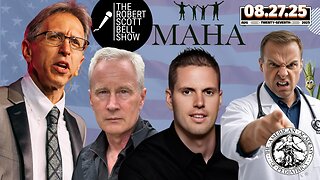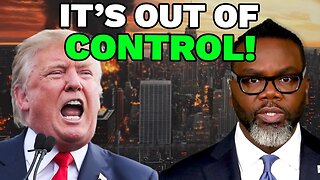Premium Only Content

Anthony Fauci's Battle with West Nile Virus
**Introduction:**
In a twist of fate, the man who became the face of the U.S. coronavirus response, Dr. Anthony Fauci, has found himself in the spotlight once again. This time, however, it’s not COVID-19 that has brought him to the forefront but a much lesser-known threat: the West Nile virus. Recently hospitalized for six days, Fauci is now recovering at home. But what exactly is the West Nile virus, and how does it affect people, especially someone as high-profile and experienced as Dr. Fauci? Let's dive into this story to understand the virus, its impact, and what we can learn from Fauci's experience.
**Section 1: What is the West Nile Virus?**
### A Silent Yet Deadly Threat
The West Nile virus (WNV) might not grab headlines like COVID-19, but it’s a significant health concern nonetheless. First identified in the United States in 1999, WNV has become the leading cause of mosquito-borne disease in the country. Unlike many other viruses, WNV is primarily spread through the bite of an infected mosquito—specifically, the Culex species.
For most people, the virus goes unnoticed. The Centers for Disease Control and Prevention (CDC) estimates that around 80% of those infected will show no symptoms at all. However, for the unlucky few, the virus can lead to severe illness, and in rare cases, even death. Symptoms can range from mild fevers and headaches to more severe issues like encephalitis (inflammation of the brain) or meningitis (inflammation of the membranes surrounding the brain and spinal cord). The fact that Fauci, at 83, was hospitalized highlights the potential severity of this virus, especially for older adults and those with weakened immune systems.
**Section 2: Fauci's Battle with the Virus**
### A Personal Fight Against a New Foe
Dr. Anthony Fauci’s hospitalization due to the West Nile virus came as a surprise to many. Known for his decades of work in infectious diseases and his prominent role during the COVID-19 pandemic, Fauci is no stranger to the dangers of viruses. Yet, even with his vast knowledge, he couldn’t avoid the bite of an infected mosquito.
Fauci’s six-day hospital stay underscores the seriousness of the virus, especially for those in higher-risk categories. Fortunately, he is expected to make a full recovery, but his experience serves as a stark reminder that infectious diseases can affect anyone, regardless of their status or expertise.
**Section 3: The Spread of West Nile Virus**
### How the Virus Travels and Infects
West Nile virus spreads primarily through mosquitoes that have bitten infected birds. Once a mosquito is infected, it can transmit the virus to humans and other animals. This transmission method makes it difficult to control, as it’s not spread through human contact like COVID-19. Instead, it relies on the presence of both infected mosquitoes and birds in an area.
In recent years, the number of WNV cases in the U.S. has fluctuated, with more than 1,800 people hospitalized last year alone, leading to 182 deaths. The virus’s presence is most common during the warmer months when mosquitoes are active, making late summer and early fall particularly risky times for infection. As Fauci’s case shows, even those who take precautions may still be vulnerable to a mosquito bite in the wrong place at the wrong time.
**Section 4: The Lack of Treatment and Vaccines**
### Facing a Virus with Few Defenses
One of the most concerning aspects of the West Nile virus is that there are no specific treatments or vaccines available. Unlike COVID-19, where vaccines have been a critical tool in reducing the spread and severity of the virus, WNV relies solely on prevention to protect people. This means avoiding mosquito bites is the primary defense—using insect repellent, wearing long sleeves and pants, and eliminating standing water where mosquitoes breed.
For those who do contract the virus, treatment is supportive, meaning doctors can only manage the symptoms rather than cure the virus itself. This lack of targeted treatment options adds an extra layer of risk, particularly for older adults or those with underlying health conditions, as seen in Fauci’s hospitalization.
**Section 5: What Fauci’s Case Teaches Us**
### A Call to Awareness and Action
Fauci’s bout with the West Nile virus serves as a powerful reminder of the unpredictability of infectious diseases. Despite his long career in public health, he still fell victim to a virus that many people might overlook. This highlights the importance of awareness, especially regarding diseases that don’t receive as much media attention as COVID-19.
Public health measures, such as community mosquito control programs and public education on preventing mosquito bites, are crucial in reducing the spread of WNV. Additionally, Fauci’s experience should encourage individuals to take personal precautions seriously, particularly during peak mosquito season.
**Conclusion: Staying Vigilant in the Fight Against Infectious Diseases**
Dr. Anthony Fauci’s recovery from the West Nile virus is a testament to the resilience of the human body, but it’s also a wake-up call for us all. In a world where COVID-19 has dominated our thoughts and fears, other threats like the West Nile virus still loom large. Fauci’s experience reminds us that vigilance is key, and that taking steps to protect ourselves from all infectious diseases is as important as ever.
As we continue to navigate the complexities of public health, let’s stay informed, take precautions, and support efforts to combat all forms of infectious disease. And if you found this article insightful, don’t forget to like, share, subscribe, and comment below. Your engagement helps us bring important health information to a wider audience, and together, we can make a difference in keeping our communities safe.
-
 DVR
DVR
StoneMountain64
5 hours agoHUNTING FOR THE FIRST WIN BACK ON WARZONE
45.5K1 -

The Officer Tatum
2 hours agoBREAKING: Shooter IDENTIFIED TR*NS , Cracker Barrel CAVES To Pressure + MORE | EP 162
23K26 -
 53:47
53:47
Matt Kohrs
2 hours agoLIVE! Nvidia Earnings Call || NVDA Stock Reaction
18K1 -
 LIVE
LIVE
Tudor Dixon
1 hour agoKarol Markowicz on Freedom, Immigration, and Saving the American Dream | The Tudor Dixon Podcast
53 watching -
 2:03:25
2:03:25
The Quartering
4 hours agoFlag Burning, Free Speech, Church Attack & More With Andrew Wilson
187K277 -
 LIVE
LIVE
The Robert Scott Bell Show
19 hours agoDr. Peter McCullough, Vaccines: Mythology, Ideology, and Reality, Dr. Dan Sullivan, Chiropractic - The RSB Show 8-27-25
169 watching -
 1:21:03
1:21:03
Darkhorse Podcast
4 hours agoFreedom, Tyranny, and Childhood Lost: The 291st Evolutionary Lens w/ Bret Weinstein & Heather Heying
34.2K15 -
 LIVE
LIVE
LFA TV
11 hours agoLFA TV ALL DAY STREAM - WEDNESDAY 8/27/25
1,535 watching -
 2:34:01
2:34:01
Steven Crowder
4 hours agoBREAKING: Minnesota Catholic School Shooting Update - Shooter & Manifesto
319K412 -
 42:22
42:22
Stephen Gardner
2 hours ago🚨CHICAGO Mayor PISSED as Residents BEG Trump to send National Guard
23.4K6